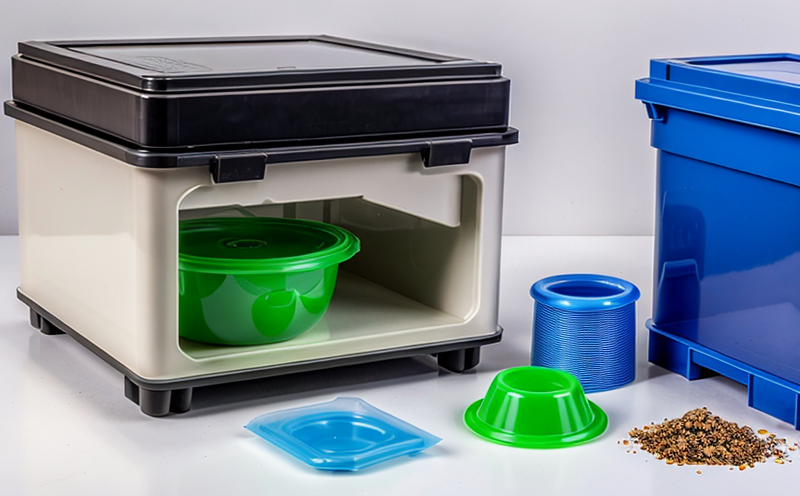ISO 21306 Identification of Plastic Packaging Polymers Testing
The identification and characterization of plastic packaging polymers is crucial in ensuring compliance with international standards, optimizing material selection for sustainability, and enhancing product performance. ISO 21306 provides a standardized method to identify plastic packaging polymers based on their thermal properties, elemental composition, and molecular weight distribution.
This service ensures that your packaging materials meet the stringent requirements of various industries such as food and beverage, pharmaceuticals, and consumer goods. The testing process involves several key steps:
- Material sampling: A representative sample is taken from the plastic packaging material under controlled conditions to ensure accuracy.
- Preparation: Samples are prepared according to ISO 21306 specifications, ensuring they are suitable for analysis by differential scanning calorimetry (DSC) and Fourier transform infrared spectroscopy (FTIR).
The testing process typically involves the following steps:
- Differential Scanning Calorimetry (DSC): This technique is used to determine the thermal properties of the sample, which can help identify the type of polymer. The DSC curve provides information about melting points and crystallinity.
- Fourier Transform Infrared Spectroscopy (FTIR): FTIR analysis allows for the identification of functional groups within the polymer structure, providing insights into the chemical composition.
The combined data from these tests can be used to identify the specific type of plastic packaging used. This information is critical in ensuring that your products comply with regulations and standards such as those set by ASTM D6817 or EN 30529.
Understanding the composition of your packaging materials also allows for optimization of material selection, which can lead to improved product performance and reduced environmental impact. By using this service, you ensure that your products are not only compliant but also sustainable and efficient in their design.
The process is detailed by ISO 21306, which outlines the steps required to perform accurate identification of plastic packaging polymers. This includes the use of specific apparatus such as DSC equipment and FTIR spectrometers, which must be calibrated according to international standards.
For quality managers, compliance officers, R&D engineers, and procurement specialists, this service offers a comprehensive approach to ensuring that your packaging materials meet the highest standards. It provides critical data for decision-making processes related to material selection and product development.
Benefits
The benefits of ISO 21306 Identification of Plastic Packaging Polymers Testing are numerous, including:
- Compliance: Ensures that your packaging materials comply with international standards and regulations.
- Sustainability: Helps in selecting eco-friendly materials for sustainable product design.
- Product Performance: Optimizes material properties to enhance the performance of your products.
- Risk Management: Minimizes risks associated with non-compliance and substandard materials.
Quality and Reliability Assurance
The identification and characterization of plastic packaging polymers are integral to ensuring the quality and reliability of your products. This service provides a rigorous testing process that adheres to international standards, thereby enhancing the overall quality assurance of your packaging materials.
The use of standardized methods like ISO 21306 ensures that the testing is consistent and reproducible across different laboratories. This consistency is crucial for maintaining high-quality standards in the industry. The detailed reports generated from this process provide a clear understanding of the material composition, which can be used to make informed decisions regarding product development.
By ensuring compliance with international standards such as ASTM D6817 and EN 30529, you demonstrate your commitment to quality and reliability. This not only enhances your brand reputation but also builds trust with customers who value sustainable and high-quality products.
The service also includes a comprehensive review of the test results by our experienced technical team, ensuring that all aspects are thoroughly analyzed and reported. This approach guarantees accuracy and reliability in the identification of plastic packaging polymers, providing you with peace of mind regarding your product quality.
Environmental and Sustainability Contributions
The ISO 21306 Identification of Plastic Packaging Polymers Testing plays a crucial role in promoting environmental sustainability. By accurately identifying the type of plastic packaging used, this service helps in selecting eco-friendly materials that minimize environmental impact.
The testing process allows for the identification of polymers that are more recyclable or biodegradable, contributing to waste reduction and recycling efforts. This is particularly important in the context of global sustainability goals, where industries are increasingly focusing on reducing their carbon footprint.
By optimizing material selection based on test results, you can contribute to a circular economy by ensuring that packaging materials are reused or recycled effectively. This not only reduces waste but also lowers production costs and environmental impacts associated with the extraction of raw materials.
The service aligns with international sustainability initiatives such as the Ellen MacArthur Foundation's New Plastics Economy, which aims to create a circular economy for plastics. By participating in this process, you demonstrate your commitment to sustainable practices, enhancing your brand’s reputation and contributing positively to environmental conservation efforts.





